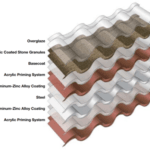Choosing the right roof for your home is a decision that should not be taken lightly. A roof is one of the most important components of your house, providing protection from the elements and insulating your home. It is crucial to select a roof that not only suits your budget but also meets your specific needs.
When it comes to choosing a roof, there are several factors to consider. The climate in your area, the architectural style of your home, and your personal preferences all play a role in determining the right roof for you. By taking the time to carefully evaluate these factors, you can ensure that you make an informed decision that will benefit you in the long run.
Factors to consider when choosing a roof
Before diving into the different types of roofing materials available, it’s essential to consider a few key factors that will help you narrow down your options.
First and foremost, you need to assess the climate in your area. If you live in an area with harsh winters or frequent heavy rainfall, you’ll want a roof that can withstand these conditions. On the other hand, if you reside in a region with scorching summers, you’ll need a roof that provides adequate insulation and reflects heat.
Next, consider the architectural style of your home. Different roof styles complement different architectural designs. For example, a traditional pitched roof may be a better fit for a colonial-style home, while a flat roof might be more suitable for a modern or contemporary house.
Lastly, think about your personal preferences and budget. Do you prefer a roof that requires minimal maintenance? Are you looking for a more eco-friendly option? How much are you willing to spend on your new roof? By answering these questions, you can further narrow down your choices and make an informed decision.
Different types of roofing materials
Once you’ve considered the key factors, it’s time to explore the different types of roofing materials available. Each material has its own unique characteristics and benefits.
Asphalt shingles are one of the most popular roofing options due to their affordability and versatility. They come in a wide range of colors and styles, making it easy to find a look that matches your home. However, they may not be as durable as other materials and may require more frequent maintenance.
Metal roofing is another option to consider. It is known for its durability and longevity, often lasting up to 50 years or more. Metal roofs are resistant to fire, insects, and rot, and they are also energy-efficient. However, they tend to be more expensive upfront.
If you’re looking for a more eco-friendly option, consider a roof made from recycled materials, such as rubber or plastic. These roofs are not only environmentally friendly but also durable and low-maintenance. They can mimic the appearance of other materials, such as slate or wood, at a fraction of the cost.
Pros and cons of each roofing material
Now that you’re familiar with the different types of roofing materials, let’s delve into the pros and cons of each option.
Asphalt shingles are a popular choice due to their affordability. They are easy to install and come in a variety of styles and colors. However, they may not be as durable as other materials and may require more frequent repairs or replacement.
Metal roofs are known for their durability and longevity. They can withstand extreme weather conditions and are resistant to fire, insects, and rot. Additionally, they are energy-efficient and can help reduce your heating and cooling costs. However, they can be more expensive upfront and may require professional installation.
Recycled rubber or plastic roofs are environmentally friendly and durable. They are resistant to rot, insects, and fire. These roofs can mimic the appearance of other materials, such as slate or wood, at a lower cost. However, they may not be as widely available as other options and may require professional installation.
Understanding your budget and roofing costs
When choosing the right roof for your budget, it’s crucial to understand the costs involved. The cost of a new roof depends on several factors, including the size of your home, the type of material used, and the complexity of the installation.
Asphalt shingles tend to be the most affordable option, with an average cost of $1,700 to $8,400 for a 1,700 square foot roof. Metal roofs, on the other hand, can range from $5,000 to $20,000 or more, depending on the type of metal used and the size of your home. Recycled rubber or plastic roofs typically fall in between, with an average cost of $8,000 to $12,000.
It’s important to keep in mind that while upfront costs may be higher for certain materials, they can save you money in the long run. For example, metal roofs are known for their longevity and energy efficiency, which can help offset the initial investment.
How to determine the lifespan of a roof
The lifespan of a roof depends on several factors, including the type of material used and the quality of installation. On average, asphalt shingles can last between 15 to 30 years, while metal roofs can last 50 years or more. Recycled rubber or plastic roofs typically have a lifespan of 30 to 50 years.
To ensure the longevity of your roof, it’s essential to invest in quality materials and professional installation. Regular maintenance and inspections can also help identify and address any potential issues before they become major problems.
Energy-efficient roofing options
In today’s environmentally conscious world, energy efficiency is a top priority for many homeowners. Fortunately, there are several energy-efficient roofing options available.
Metal roofs are known for their energy efficiency, as they reflect heat and sunlight away from your home, reducing the need for air conditioning. Additionally, certain types of metal roofs can be installed with insulation, further enhancing their energy-saving capabilities.
Other energy-efficient options include cool roofs, which are designed to reflect more sunlight and absorb less heat than traditional roofs. These roofs are typically made from light-colored materials or coated with reflective paint.
Finding the right roofing contractor
Choosing the right roofing contractor is just as important as selecting the right roof. A reputable contractor will ensure that your roof is installed correctly and will stand the test of time.
Start by asking friends, family, and neighbors for recommendations. Look for contractors who are licensed, insured, and have a good reputation in your community. It’s also important to ask for references and check online reviews to get a sense of their previous work.
When meeting with potential contractors, ask about their experience with the type of roof you’re considering. Request a written estimate that includes the cost of materials, labor, and any additional services. Finally, make sure the contractor offers a warranty on their workmanship and the materials used.
Roofing warranties and maintenance
Before making a final decision, it’s important to understand the warranties and maintenance requirements associated with your chosen roofing material.
Most reputable roofing manufacturers offer warranties on their products. These warranties typically cover defects in materials and workmanship for a specified period. Be sure to read the warranty carefully and understand what is and isn’t covered.
Regular maintenance is essential to prolonging the lifespan of your roof. This includes cleaning gutters, inspecting for damage after severe weather, and addressing any issues promptly. It’s also a good idea to schedule annual inspections with a professional roofing contractor to catch any potential problems early on.
Conclusion: Making the right decision for your budget and needs
Choosing the right roof for your budget and needs is a decision that requires careful consideration. By evaluating factors such as climate, architectural style, and personal preferences, you can narrow down your options and make an informed decision. Consider the pros and cons of each roofing material, understand the costs involved, and determine the lifespan and energy efficiency of your chosen roof. Don’t forget to find a reputable roofing contractor and understand the warranties and maintenance requirements associated with your chosen material. With the right information and careful planning, you can make a decision that will protect your home and provide peace of mind for years to come.




